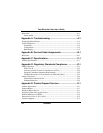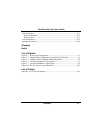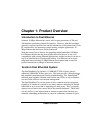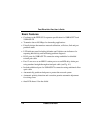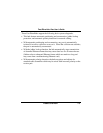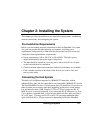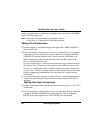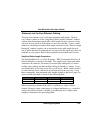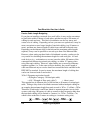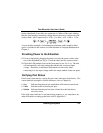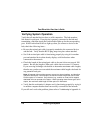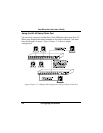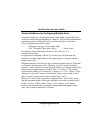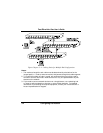
Fast EtherHub-12se User’s Guide
2-4 Installing the System
Precise Cable Length Budgeting
If you plan on installing a network for a small office, it may not be convenient
to place hubs within 5 meters of each other, and then run up to 100 meters of
cabling for each end user. This kind of installation can be very messy and
wastes a lot of cabling. Depending on how your users are spread out, it may be
more convenient to run a longer length of inter-hub cabling (say 50 meters or
more), and then run shorter lengths of cable from each hub to the end users.
Depending on the inherent delay in the hub and the maximum cable lengths
required, it may even be possible to cascade up to three Fast Ethernet hubs.
However, when setting up these kinds of distributed cascades, you have to be
very careful in calculating the maximum length for each node pair. All end-
node devices (e.g., workstations or servers) must be within 100 meters of the
connected hub when using twisted-pair cabling, or within 112 meters when
using fiber optic cabling. However, when linking one or more Fast Ethernet
repeaters together (i.e., in the same collision domain), the overall length of
cable used between any two nodes should not exceed the limits outlined in the
IEEE 802.3u standard. In precise terms, the maximum length of cabling that
can be run from end-node to end-node is
367m
≥ S(repeater equivalent length)
+ S(length of category 5 twisted-pair cable)
+ (0.9 * S(length of fiber optic cable
1
)) 1 - if fiber is used
This repeater has an inherent delay of 90 bit time or 80 meters of twisted-pair
cable. Taking a daisy chain of two hubs connected with twisted-pair cabling for
an example, the maximum length from node to node is 367m - (2 x 80m) = 207m.
Therefore, if both node A and B are linked to separate repeaters in a two hub
system, each using 100 meters of cable to connect to their respective hub, then
the inter-hub cabling will be limited to 5 meters (i.e., 207m - 2x100m = 7m,
which is then reduced to 5 meters according to a common wiring rule).



